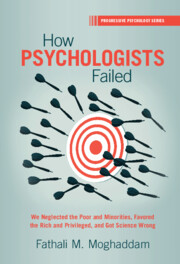 How Psychologists Failed
How Psychologists Failed Book contents
- HOW PSYCHOLOGISTS FAILED
- The Progressive Psychology Book Series
- How Psychologists Failed
- Copyright page
- Dedication
- Contents
- Preface
- Acknowledgments
- Chapter 1 Why We Must Rethink Psychology
- Part I Psychological Processes
- Chapter 2 Cognition and Decision-Making in Societal Context
- Chapter 3 Mis-measuring Intelligence and Justifying Educational Inequalities
- Chapter 4 Personality and the Power of Context
- Chapter 5 Consciousness: Decontextualized and Contextualized Approaches
- Chapter 6 Motivation and Resilience: Self-Help Myths and the Reality of Invisibility
- Chapter 7 Group Life and Diversity
- Part II Rethinking Behavior in the Larger World
- Part III Looking Ahead
- Notes
- References
- Index
Chapter 2 - Cognition and Decision-Making in Societal Context
from Part I - Psychological Processes
Published online by Cambridge University Press: 27 October 2022
- HOW PSYCHOLOGISTS FAILED
- The Progressive Psychology Book Series
- How Psychologists Failed
- Copyright page
- Dedication
- Contents
- Preface
- Acknowledgments
- Chapter 1 Why We Must Rethink Psychology
- Part I Psychological Processes
- Chapter 2 Cognition and Decision-Making in Societal Context
- Chapter 3 Mis-measuring Intelligence and Justifying Educational Inequalities
- Chapter 4 Personality and the Power of Context
- Chapter 5 Consciousness: Decontextualized and Contextualized Approaches
- Chapter 6 Motivation and Resilience: Self-Help Myths and the Reality of Invisibility
- Chapter 7 Group Life and Diversity
- Part II Rethinking Behavior in the Larger World
- Part III Looking Ahead
- Notes
- References
- Index
Summary
Poverty has an important impact on cognitive processes and decision-making, but this topic is neglected in mainstream psychology and almost completely absent from the standard introductory psychology textbooks. The causal-reductionist model of mainstream psychology leads to a focus on intra-personal characteristics. If this perspective is adopted to examine the psychology of poverty, the result is more 'blaming the victim,' in the sense that the characteristics of individuals (personality, intelligence, motivation, and so on) would be used to explain poverty. In this sense, psychology is ideology. That is, psychology serves to justify the status quo, depicting the poor and the rich as meriting their positions on the basis of intra-personal characteristics. The emerging research on psychology and cognition demonstrated that poverty in important ways shapes cognitive functioning.
Information
- Type
- Chapter
- Information
- How Psychologists FailedWe Neglected the Poor and Minorities, Favored the Rich and Privileged, and Got Science Wrong, pp. 15 - 29Publisher: Cambridge University PressPrint publication year: 2022